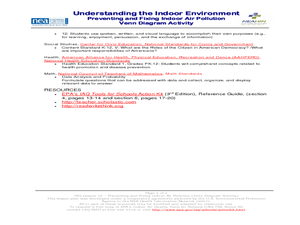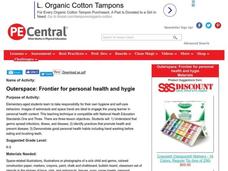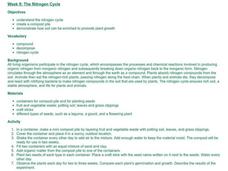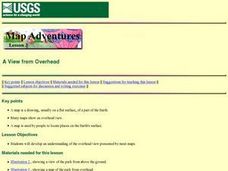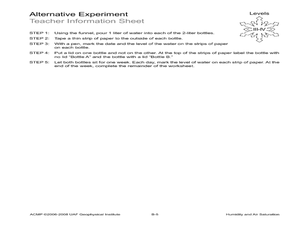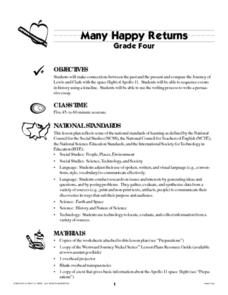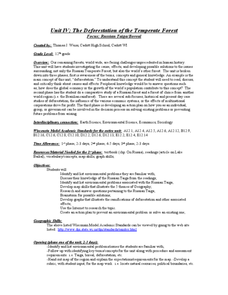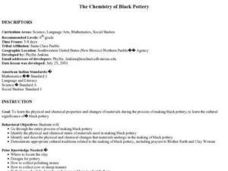Curated OER
Dreaming of Gardens
Students demonstrate ways to be an environmental philanthropist. For this philanthropy lesson, students read The Gardener and Just a Dream and compare the two books. Students discuss ways the characters demonstrated environmental...
Curated OER
Understanding the Indoor Environment:Preventing and Fixing Indoor Air Pollution
Students explore air pollution. For this environmental studies lesson, students work with a partner to create a Venn diagram comparing and contrasting possible solutions to prevalent indoor air pollution problems. Students...
Curated OER
Outerspace: Frontier for Personal Health and Hygiene
Students view photos of astronauts sleeping, eating, bathing, and using the toilet, and discuss hygiene problems in a zero-gravity environment. They contrast hygiene habits in space to those on Earth, and create storybooks illustrating...
Curated OER
The Nitrogen Cycle
Students design and create a compost pile in order to study the Nitrogen Cycle. They then use the scientific method to determine if plants grow better when they add organic matter from their compost pile to the plant's soil.
Curated OER
Properties of Rocks
Students compare the properties of rocks. They identify objects made of rocky materials such as walls, sidewalks, etc. Students describe and group rocks based on their characteristics.
Curated OER
Beach Erosion Investigation
Learners determine the effects of gentle and strong waves on beach erosion. They use a stream table to simulate a beach and sketch the beach profile after simulated waves of different sizes.
Curated OER
Weather v. Climate
Ninth graders discuss the differences between climate and weather as a class. Using data they collected, they create a graph of the data to share with the class over a specific time period. They compare and contrast this data with...
Curated OER
A View from Overhead
Learners explore the concept of mapping. Using given illustrations, students observe views of a park from above the ground. They compare and contrast the different views. Learners discuss uses for maps. Using a resource from the...
Curated OER
Mapmakers' Perspective
Students examine several maps and consider mapmakers' perspective in early depictions of North America.They determine how the spherical shape of the earth makes any north-south and east-west orientation a matter of perspective. For...
Curated OER
Look at Those Leaves!
Students observe leaves. In this math and science cross-curriculum leaf activity, students take a nature walk and collect leaves. Attributes are assigned and leaves are sorted in various ways. Students use non-standard or standard units...
Curated OER
United States Map
Students compare the United States on a globe and on a map. In this map instructional activity, students relate the sizes of the continents and locate the United States. Students identify the location of the continental US as well as...
Curated OER
Humidity and Air Saturation
Students experiment with air saturation. In this earth science lesson, students first complete an activity which teaches humidity. Then they use the scientific method to create their own experiments to test how long it takes a...
Curated OER
Bible: Creation
Students compare and contrast the two creation stories of Genesis 1-2:3 and Genesis 2:4-5. In this creation accounts lesson, students work in small groups to outline the two stories, noting similarities and differences. ...
Curated OER
How Does Climate Affect Plant Growth?
First graders compare plant samples obtained from two different sites to explore how climate affects plants.
Curated OER
Learning Activities: Magic Words
Learners use poetry to compare and contrast humans and frogs.
Curated OER
Kepler and his Laws
Students examine Kepler's Laws. They confirm Kepler's 3rd law by comparing orbital periods and mean distances for all major planets and study conic sections, qualitatively.
Curated OER
Clay Planets
Students create scale models of the planets out of clay and compare them to the real planets.
Curated OER
Is Your Water Clean?
Students compare water quality of different sources. They test water samples for odor, phosphates, pH, bacteria, and dissolved solids. they fill out a data table and answer questions about their findings.
Curated OER
Many Happy Returns
Young scholars compare the journey of Lewis and Clark with the space flight of Apollo 11. Students sequence events using a timeline. Young scholars write a persuasive essay trying to persuade the people of the US to support space...
Curated OER
The Deforestation of the Temperate Forest Focus; Russian Taiga/Boreal
Twelfth graders complete a unit of lessons on the Russian Temperate Forest. They list the environmental problems associated with deforestation, conduct research, compare the Russian Taiga with other forests, create graphs, and develop an...
Curated OER
The Chemistry of Black Pottery
Sixth graders create pottery out of black clay using traditional methods. They demonstrate appropriate Native American cultural traditions related to the making of black pottery, including prayers to Mother Earth and Clay Woman.
Curated OER
Summarize This!
Students explore how to summarize a reading passage. They read non-fiction books. Students use a Venn Diagram to compare and contrast the two animals they read about. They write a summary using the information in their Venn Diagram.
Curated OER
Athabaskan Migration & Bering Strait
Students study Athabaskan migration patterns and the Bering Strait Land Bridge theory. They investigate the importance of the expansion of trade and compare the differences between American Indian oral tradition accounts of origin and...
Curated OER
Roots of the World
Students recognize consist stems, trunks, leaves, and roots. They compare different types of roots by observing and comparing photographs. Aterwards, they observe the growth of a lima bean plant and document changes in root and shoot...



